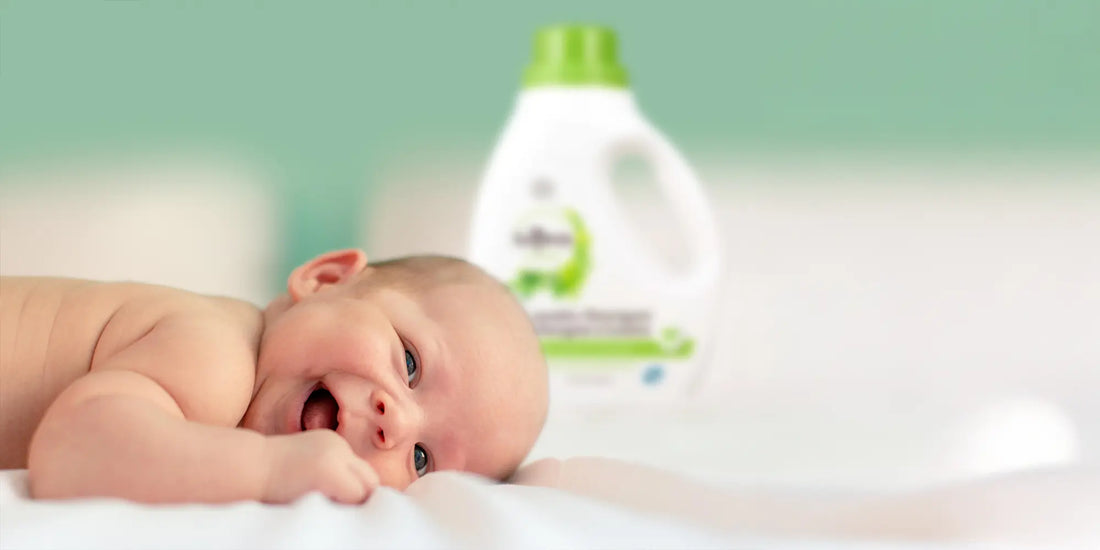
Baby-safe cleaning: using EWG to help you find safe cleaners
In previous articles, we explained why you should look for baby-safe cleaning products for your family, and what to look out for in a product - such as green certifications and ingredients. While these new discoveries mean a safer home for your family, this also mans you'll have to put in some effort and do a bit of digging to find a non-toxic cleaner that really works.
The good news is that there are tools to help you in your research.
ENVIRONMENTAL WORKING GROUP
One useful source is the Environmental Working Group (EWG). The EWG was formed in 1983 and is a US non-profit organization dedicated to protecting human health and the environment. They research a variety of products for their toxicity in order to allow consumers to make better choices.
The EWG database includes cosmetics, sunscreen, cleaning products and many more.

HOW THE EWG WORKS
The EWG rates the products from A (lowest concern - no or few known or suspected hazards to health or the environment) to F (highest concern - potentially significant hazards or lack of full disclosure) based on the weight percentage of the rating of the ingredients. The product rating indicates the relative level of concern posed by exposure to the ingredients in this product compared to other product formulations.
The ingredient ratings are based on published scientific literature and include known and suspected hazards to human health and/or the environment. While the EWG is a US organization, its published scientific literature includes research not only from the Environmental Protection Agency (EPA), Food and Drug Administration (FDA), and National Toxicology Program (NTP), but also from the European Union, which typically has stricter rules on chemicals than North American legislation.
The EWG highlights both health risks identified by U.S. government agencies and potential health and environmental hazards. As a result, their health concerns extend to ingredients permitted under less rigorous eco standards, such as ethoxylated alcohols, sodium lauryl sulfate (SLS), and sodium laureth sulfate (SLES), which may be contaminated with the carcinogens ethylene oxide and 1,4-dioxane.
INCOMPLETE LISTS OF INGREDIENTS AND NON-SPECIFIC INGREDIENTS
When manufacturers fail to provide a complete ingredient list, the EWG’s team of scientists, policy experts, lawyers, communication specialists, and programmers conducts thorough research. They review the manufacturer’s website and publications to uncover the ingredients used in the product. This transparency ensures consumers can make informed decisions about safe, non-toxic, and eco-friendly products. Many ingredient lists include non-specific ingredients like "non-ionic surfactant" or "coconut-derived surfactant" - which don't tell us anything. Ingredients like SLS (sodium lauryl sulfate) and SLES (sodium laureth sulfate) are often hidden under these labels and are penalized by being excluded from the total product score to prevent artificially boosting product ratings. Additionally, all fragrances are automatically rated "D" due to their high risk of health and environmental hazards.

EWG'S GUIDE TO HEALTHY CLEANING
In EWG's Guide to Healthy Cleaning, there is a mix of green and conventional cleaning products. However, many supposedly green and non-toxic cleaning products with eco-certifications like Safer Choice, Green Seal or EcoLogo have been rated lower than A by EWG. In fact, only 5.5% of all the bathroom cleaners listed on EWG are rated A, meaning that a whopping 94.5% show potential hazards to health or the environment.
Even more concerning, 37.3% of all bathroom cleaners in the database are rated "F," indicating the highest level of health and environmental hazards. Kitchen cleaners fare only slightly better, with just 6.5% receiving an "A" rating and a surprising 29% rated "F." Alarmingly, many of these "F"-rated products come from brands typically marketed as eco-friendly and even those with green certifications.
BRANDS WITHOUT EWG RATING
As a concerned parent, you probably already have checked the ratings for the cleaning products you currently use in your home. However, while the EWG database is quite extensive and continuously growing, it may not include some products you are searching for. But why are these products not included?
It’s not surprising that the EWG doesn’t list all the brands. There are hundreds of brands and thousands of products, and they keep getting re-formulated all the time. But then again, getting a product rated by the EWG is completely free - the manufacturer does not have to pay to get their products reviewed and the ratings published in their database. Therefore, it seems strange that some cleaning product manufacturers, especially "green" cleaners, don’t have EWG ratings for their products. If the product is truly eco-friendly and non-toxic, they should want to have it rated and published in EWG's database - unless they have something to hide!
BABY-SAFE CLEANING PRODUCTS
Together with a reputable and strict eco-certification, an A rating in the EWG’s Guide to Healthy Cleaning highlights which cleaning product will have little to no health risks for your little one. Even better, EWG goes beyond the list of ingredients on the product labels. Their team also has the ability to identify some hidden ingredients manufacturers would rather keep secret. That means that EWG’s guide to healthy living is also a fantastic platform to find non-toxic products that are safe to use around your pets and family.

AspenClean and all our products are proudly Ecocert certified, meeting rigorous standards for ingredient toxicity, approved suppliers, and sustainable manufacturing practices. Rated A by the Environmental Working Group (EWG), our products are 100% natural, hypoallergenic, and entirely safe for babies. Trust AspenClean for eco-friendly, non-toxic cleaning solutions that prioritize health and the environment.